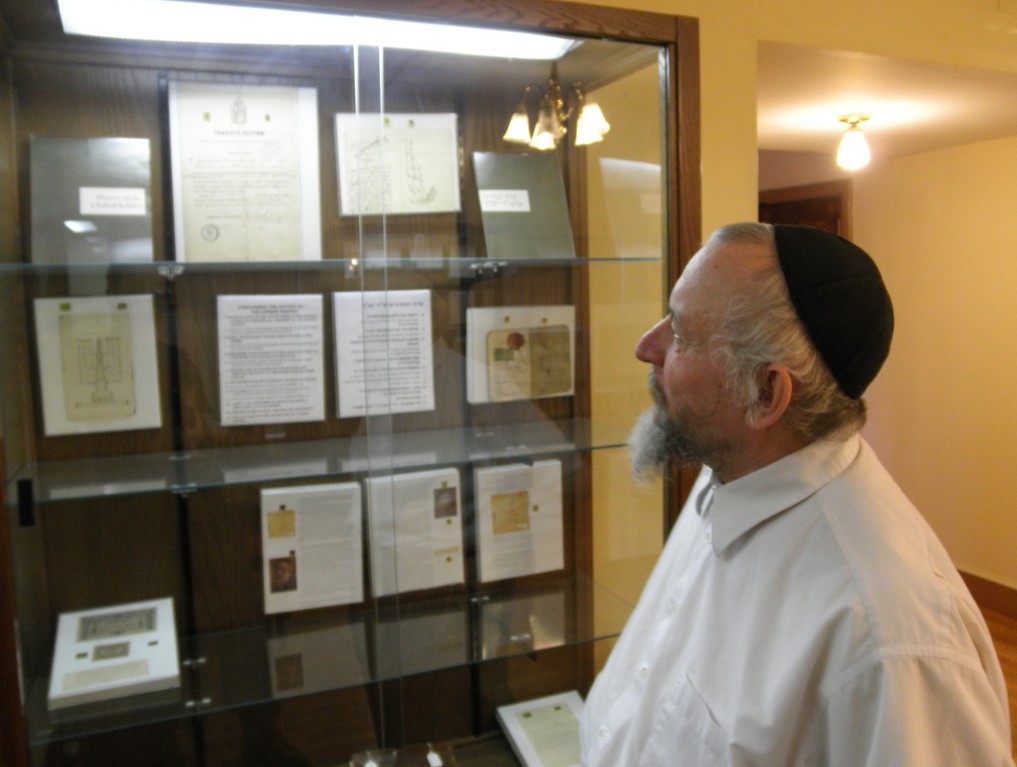From Russia with lawsuit
Chabad Library missing its core
Far away from the courtrooms and art galleries that are the focus of an international custody dispute, bookshelves hold treasures hearkening back to the origins of the Chabad Lubavitch movement. But even with 15,000 volumes, the curators feel a void in the priceless collection.
“It was a part of the Rebbe and all the generations of Chabad rebbes. Its value is that they belong to us,” said librarian Efraim Keller. “The communists confiscated them and Russia refuses to give them back.”
Some 12,000 books and 50,000 religious documents remain in Russian custody, part of a larger collection properly called Library of Agudas Chassidei Chabad –Ohel Yosef Yitzchok.
The U.S. collection is housed at 770 Eastern Parkway, the Chabad headquarters. Visitors are buzzed in through two doors before entering the exhibition hall on the third floor, a quiet space above the ever-crowded sanctuary where learning and prayer take place at any given hour.
“This library is not open to the public, it’s only for researchers who cannot find their books in any other library,” Keller said.
The collection dates to the first rebbe, Shneur Zalman of Liadi, who began the collection with a few hundred Jewish books. Even then, the library suffered setbacks, with fires in 1810 and 1813. But the greatest setback occurred during the First World War.
Fearing a German reprisal, Fifth Rebbe Sholom Dovber Schneersohn fled the village of Lyubavichy and sent the library to Moscow. Following the war, communist authorities had it confiscated and it remains in custody of the Russian State Library.
“We first located the collection in 1988 after their denials that it existed,” said chief librarian Rabbi Sholom Dovber Levine. “We wanted to see the collection but they did not let us.”
Showing the Russians a catalog of the books, Rabbi Levine received access to them. “Most of them had the handwriting of the rebbeim of Chabad.”
Chabad won in a 1991 Russian court ruling, but the Russian government negated it and the fight continues in American courts.
“They actively litigated it for five years, but when they lost the battle, they turned tail, ran home and ignored the court,” said Chabad lawyer Seth Gerber. “It’s unjustifiable under international law.”
In the mean time, the Brooklyn collection continues to expand. On the display shelves, a Russian ruble from 1918 has a handwritten blessing from the Fifth Rebbe and a reddish shtreimel worn by the Sixth Rebbe. “It’s like a Lubavitch Library of Congress. It has flyers, photographs, videos, everything you could imagine,” said Rabbi Eli Blokh, director of Chabad of Rego Park in Queens, who previously worked at the library. Born in Moscow, Blokh was fascinated to find photographs sent in from the Soviet Union.
“It was a time when shlichus was an underground activity and they took pictures of farbrengens in people’s apartments,” Rabbi Blokh said.
While the library remains under tight security, the public can get a glimpse through “Mibeis HaGenozim - Treasures From The Chabad Library,” a coffee-table album containing images from the collection, edited by Rabbi Levine.
The legal battle has now drawn in the Metropolitan Museum of Art and the National Gallery of Art in Washington, which were scheduled to borrow artworks from Russia. Russia canceled the deal, fearing that American courts would hold the Russian-owned works to ensure Russian compliance with the Chabad Library verdict.
“There is no justification for holding stolen properties, and we will seek all appropriate legal remedies,” said Gerber.
As the legal fight intensifies, Rabbi Levine does not expect reprisal towards Chabad in Russia.
“They understand that it’s only a court case,” Rabbi Levine said. “It’s the core of our book collection."






